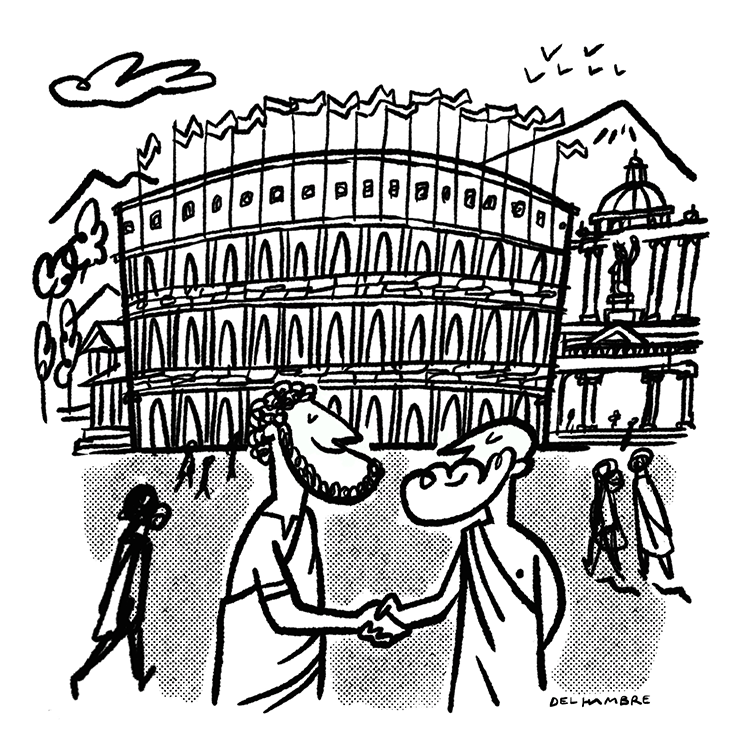When we think of the ancient world, two civilizations often come to mind first: Greece and Rome.
This makes sense. For a period of nearly a thousand years, one of the two (Rome for much longer) dominated the ancient world. Their influence stretched from Italy in the west all the way to the eastern lands of Afghanistan.
Because the Romans were the dominant power in the region for so much longer, it’s easy to think that they rose as the Greeks fell. But this isn’t really what happened.
Instead, while the Romans did conquer the Greeks, what came next was really a fusion of the two cultures.
This process actually helped strengthen the Roman empire, kept Greece economically and politically important throughout the Middle Ages, and greatly contributed to the formation of the modern world.
Rome Eyes the Greek Kingdoms
Rome and Greece became intertwined in the second century BC when the Macedonians decided to support Rome’s archrival at the time: Carthage.
Located in modern-day Tunisia along the North African coast, Carthage was Rome’s biggest competitor. The wars fought between the two helped Rome establish itself as the dominant power in the Mediterranean.
Once Carthage had been dealt with, the Romans looked towards the Macedonians. For nearly 50 years, the two sides fought.
As this happened, the Romans also became much more politically involved in Greece. Mainly, they began to hold considerable influence with the ruling party in Athens.
Eventually, the Romans were victorious over the Macedonians, which all but gave them control over Greece. However, several cities, led by Corinth, didn’t like the idea of being Roman. Together they formed the Achaean League and rebelled against Rome.
Their resistance lasted all of two years, ending in 146 BC with Rome’s victory in the Battle of Corinth, which left the city in ruins.
The Greeks tried again to rebel in 88 BC, this time led by Athens. But this too failed, leaving the entire Greek peninsula in desperate shape. So much war and conquest had destroyed its economy. But it would soon experience a revival, giving new life to the ancient Greeks.
Establishing Achaea
After conquering Macedonia, the Romans almost immediately turned it into a province. This was the main political unit of the Roman empire. Doing so put the region under direct Roman control. But it also gave the elite classes in Macedonia the chance to participate in local government. As a province, they would also have a voice in the Roman senate.
Initially, Rome did not do this in mainland Greece. The cities there were expected to pay taxes to Rome and recognize its leadership, but they were not officially part of the empire.
However, this changed when Athens led its rebellion in 88 BC. Seeing that these Greeks would continue to be a problem, the Romans created the province of Achaea.
They made Corinth the capital and invested heavily to rebuild it. They also funded several major construction projects in Athens.
All of this brought economic prosperity to the region once more and renewed Greek influence on the Roman empire.
A Greco-Roman Empire?
As Achaea and Macedonia prospered, they became increasingly important parts of the empire. But in addition to providing Rome with an economic advantage, supporting Greek culture also helped them grow their influence and power.
Throughout much of North Africa and western Asia, Greek was the dominant language. Spread throughout the lands thanks to Alexander the Great and the subsequent Greek kingdoms of the Hellenistic Era, Greek was everywhere.
As a result, the Romans wound up adopting Greek as an official language of their empire. In fact, if you walked the streets of Rome during the early years of the Roman empire, you were just as likely to hear their native tongue, Latin, as you were Greek.
The Romans also appropriated many of the Greek gods into their own mythology to win over the support of Greek people across the empire. This was only necessary, and effective, thanks to the dominance of Greek religious customs at the time.
By making use of Greek language and culture, and providing for its prosperity, Rome leveraged the existing Greek influence in the region to make itself more powerful. It also made use of existing political structures throughout Asia and North Africa to secure its own rule.
In this sense, there’s an argument to be made that the empire we know as Rome was part Greek and part Roman. Yes, political power was centered in Rome. But without the influence of Greece, it’s hard to imagine Rome achieving the level of dominance it had during the ancient era.
Prospering After the Split of Rome
For nearly 300 years, Greece prospered under Roman rule. The Greek language remained prominent throughout the empire, and the formerly Greek cities of Athens, Corinth, and Alexandria had become important political and economic hubs connecting the eastern and western parts of the Roman empire.
This became even more true after the Roman Emperor Constantine moved the capital of the Roman empire to Byzantium, a once-Greek city that is now the modern city of Istanbul.
Its close proximity to the new Roman capital made Greece an even more important economic center than before. Later, Greece would fall under the Byzantine and Ottoman Empires. But it’s language and customs remained critical to anyone trying to gain control of eastern Europe and western Asia.
An Enduring Legacy
Due to the dominance of the Greeks in the centuries before the Romans, their history remains alive to this day. Such widespread influence could never really be replaced, and so the Romans just made use of it.
In doing so, they established one of the largest, longest-lasting, and most-influential empires in world history.
So, while the ancient Greeks may have lost their autonomy and independence to the Romans in the middle of the second century BC, their profound influence in the region has kept them relevant through Roman times and up until this very day.
Written by Matthew Jones
